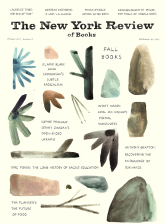In response to:
The First Russian from the August 18, 2022 issue
To the Editors:
Jennifer Wilson’s fascinating article on Pushkin’s Blackness [“The First Russian,” NYR, August 18] leaves a gap in treatments of the poet’s African heritage between 1981 and 2006. In 1987 the height of glasnost coincided with the 150th anniversary of the poet’s death. Nationalist cultural voices, growing in confidence and popularity, used this occasion to reinforce the genetic purity of their hero by erasing his African roots, while also placing the blame for his death on foreign (read: “Jewish”) forces. A leading conservative journal, Nash Sovremennik (Our Contemporary), interviewed a disabled veteran named Andrei Cherkashin, who had spent forty years compiling the most complete Pushkin genealogy to date. The resulting document covered a thousand years, and more than five thousand names, a virtual Who’s Who of Russian history and culture. The only famous relative who does not appear in Cherkashin’s account is Abram Gannibal. In Cherkashin, Nash Sovremennik presented a model genealogy as well as a model Pushkin scholar: a righteous, passionate, nonintellectual man of the people.
From the study of Pushkin, the move to reinforce literary Russianness spread to other revered writers, whose gene pool must be pure and whose deaths, if not obviously from old age, must be attributed to hostile forces. This discussion “uncovered” a pattern of the physical annihilation of Russia’s greatest writers (Lermontov, Blok, Esenin, Shukshin, and Rubtsov, among others). Obvious violations of fact and logic were swept away by statements of disdain for the Western preference for rational explanations over native intuition. Any neglect of the homes associated with the nation’s great writers was additional evidence of what was seen as a concerted effort to “kill” Russian culture. This very heated discussion died down after a few years, but the current political and cultural rhetoric coming out of Russia demonstrates that this mode of thinking was ready and waiting for another stressful historical moment.
Kathleen Parthé
Princeton, New Jersey
Emeritus Professor University of Rochester



